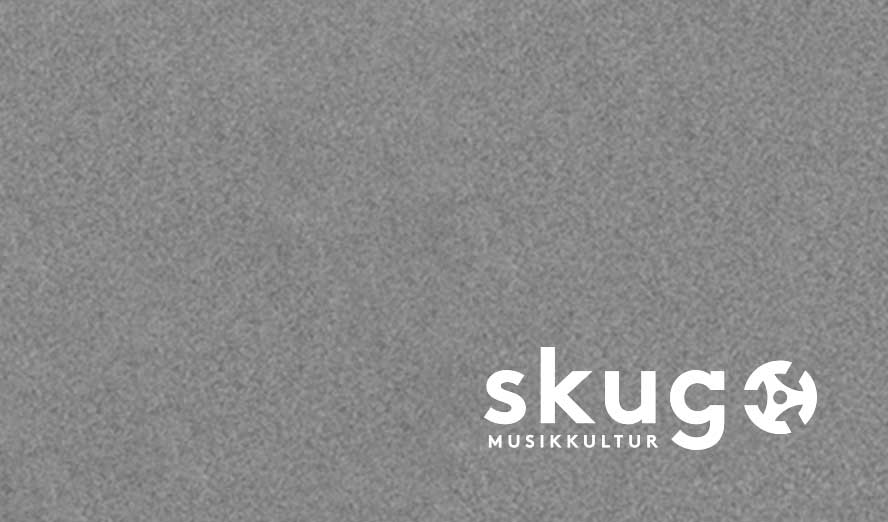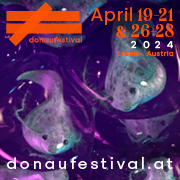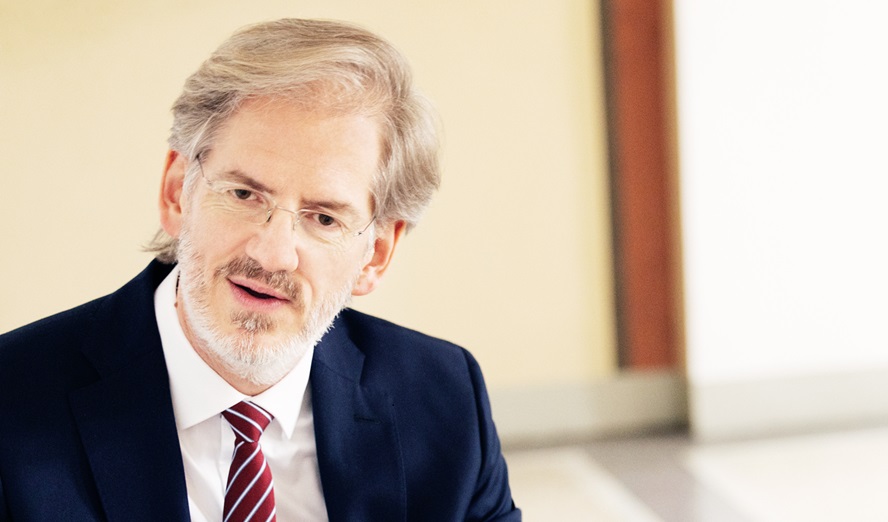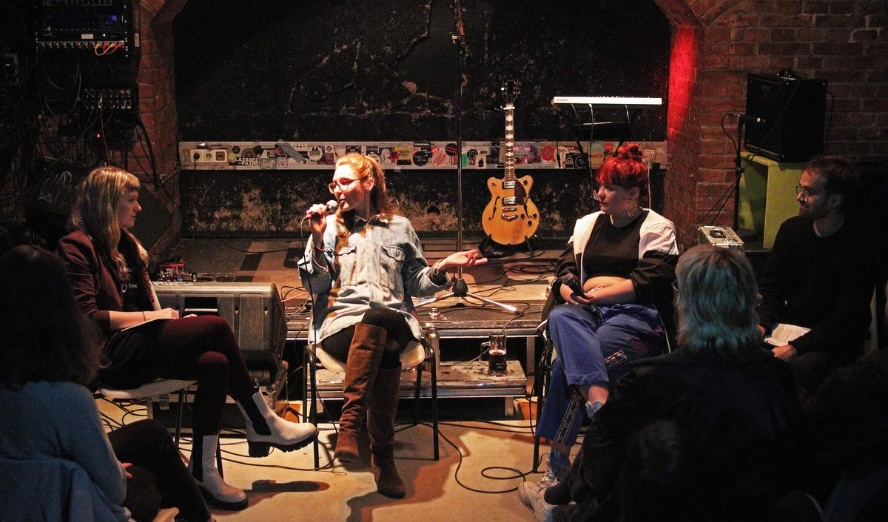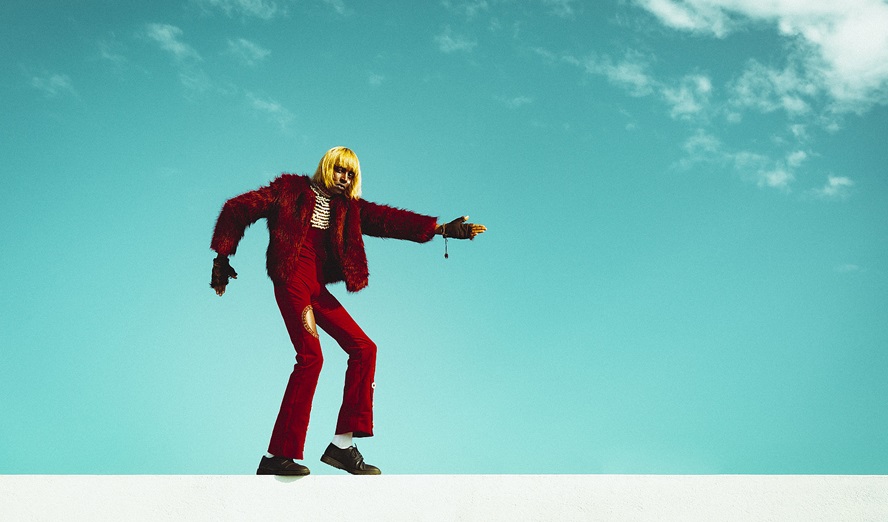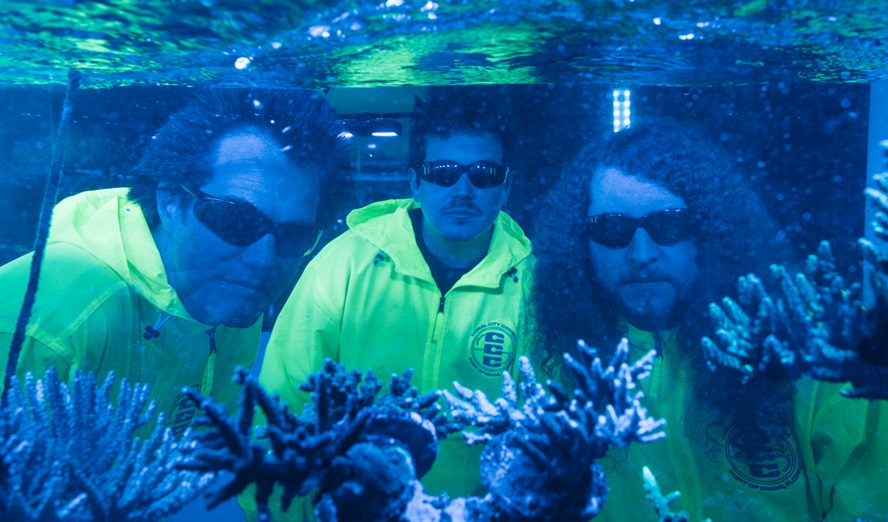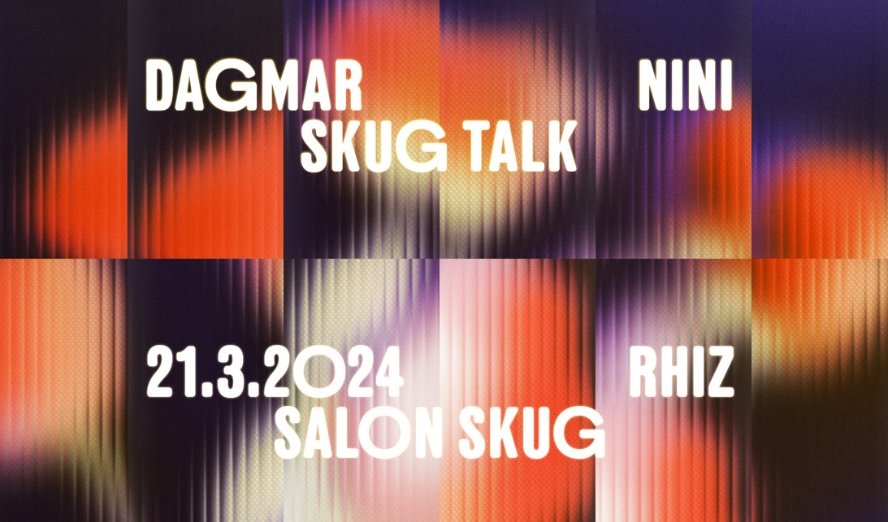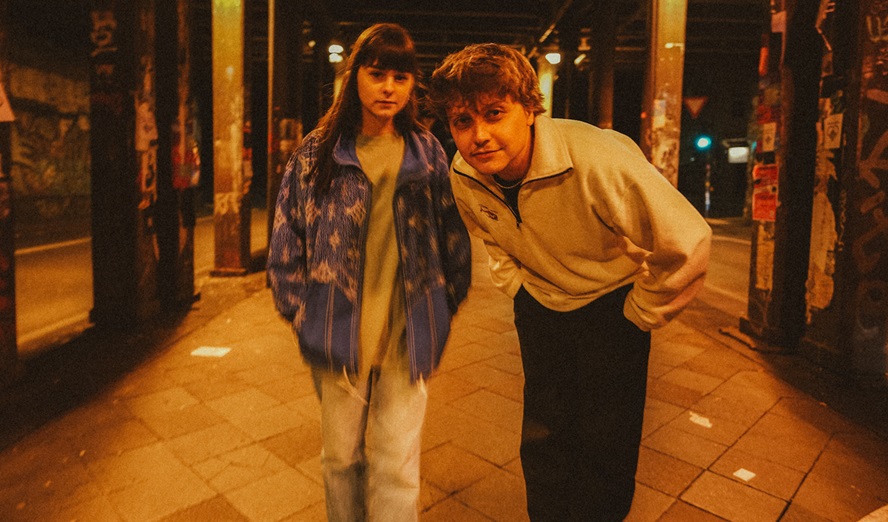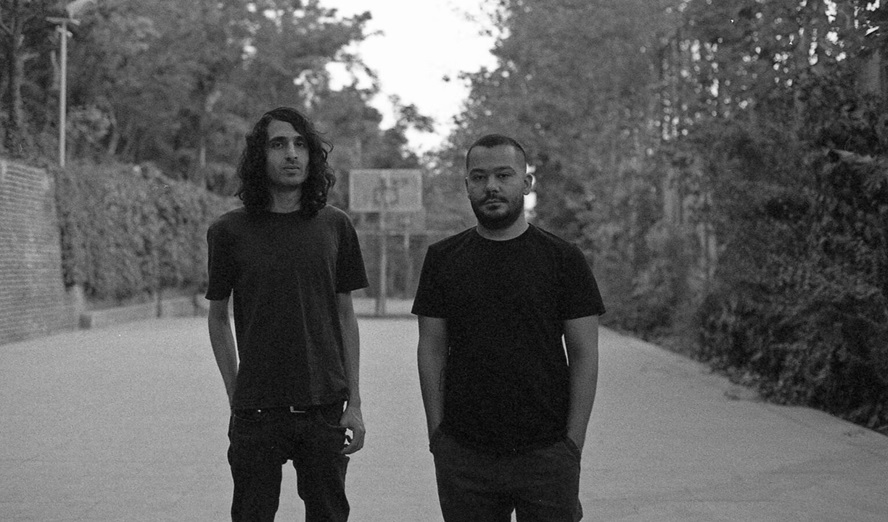skug: Do people tend to romanticize nowadays when they speak about the era of 1978 and the following years or has it really been such a vivid and incomparable time for music and arts heading towards independence?
Murray Fenton (MF): It was a very exciting time to be young, make no mistake. The DIY element of it all gave musicians a voice they previously never had. You didn’t have to be Pink Floyd with banks of keyboards and laser shows, a £20 department store electric and a desire to create something new was all you needed.
Sheffield has been known as a major industrial engine of the UK. How do you experience your hometown today? Has the cityscape changed much from when you started out as a band in the late 1970ies?
MF: The city is virtually unrecognisable these days. Sheffield was the heart of the UK steel industry back then, now those buildings all lay to waste or have been flattened to make retail parks! There’s a lot of glass and steel structures rising up into the sky, these days a lot of the charm has disappeared.
Where would you locate the personal/cultural background of each of the members? Do you feel like coming from of a typical working-class environment? And if so, how did it react on your attempts to become an artist instead of a »decent« worker or a trade union member?
MF: We all come from similar working class backgrounds, though to us, music was a job. A very poorly paid one at times and we certainly »struggled for our art« at times. It’s strange now being back together because in a way, it’s easier to enjoy the music because there is little pressure to make a living from it.
Phil Oakey and Martyn Ware from the Human League listed Roxy Music as one of the biggest musical influences at that time in Sheffield. Do you recall any major influences that changed the way you were experiencing music – like Jarvis Cocker felt after seeing an Artery gig for the very first time and deciding to form Pulp?
Mark Goldthorpe: I was influenced by the likes of Bowie, Iggy Pop, Lou Reed. I remember seeing Lou Reed in Sheffield in 1976 and being completely blown away by it, changed me forever. The next day I started writing and never looked back.
In a BBC radio broadcast, Jarvis Cocker mentioned that »A lot of people compared [Artery] to Joy Division in a way, and there were similarities […]«. Do you agree, were there similarities? Have you been fans of the Factory/Manchester scene in your early days?
MF: Retrospectively, yes. It’s hard to imagine a world without the internet, the immediacy with which you can discover new bands, MTV, mass radio channels. Back in 1978 we had one radio show – John Peel – where you heard anything remotely different. You’d read little snippets about bands in NME but again, the coverage was miniscule compared to what is at your fingertips now. The whole post-punk thing all fell from the same influences really, the whole Bowie fused with punk and grim Northern industrial landscapes. The initial burst of enthusiasm of punk got people into making music. The? became Artery, Warsaw became Joy Division, The Crucial Three spawned three major bands in Liverpool … all around the same time, all blissfully unaware of any kind of cohesion between what the other was doing. It’s quite uncanny really but that’s how the whole post-punk thing happened!
Did you ever refer to artists and movements like Dada, Existentialism or Willam S. Burroughs and his cut-up-art willfully like you do with David Lynch today (in the song and video »Who’s afraid of David Lynch«), or did you develop your work without paying much attention to theory and concepts?
MF: Sheffield had a lot of arty acts at the time, people who would stretch the boundaries of performance. The was a lot of spontaneous sex with fruit and other tasteless depravities taking place on stages! Ourselves, well we just wrote and what came out, came out. I remember we used Burroughs recordings as entry pieces sometimes though.
How much did you enjoy experimenting with new instruments and more »exotic« musical genres than rock music? How does creating sounds work now in comparison to the times of (back then) innovative tape looping and synthetic sounds?
MF: In the early days, a lot of the sounds such as the Vox organ, random percussion etc. was utilising cheap, available instruments. Mick Fiddler got some amazing, original sounds from the saxophone. These days we still use a lot of retro equipment, especially the keyboards and guitar amps.
Mark once had a legendary stage appearance where he climbed out of a window, nearly killing himself accidentally. Did you actually ever feel being part of a No Future generation dealing mainly with angst, depression and suicidal tendencies? If so, did the music help you to go on, or has it simply never been that serious?
MF: You never knew what to expect of an Artery gig back then. The stage performances would often scare the audiences. The legendary window gig overlooked a large square in the city and was high in a beautiful old building. Mark disappeared out of the window and the audience recoiled in horror, but it was very much a spur of the moment thing. Although some lyrics do deal with depressive issues, we were never really about that kind of thing and neither were the audiences of the day. It wasn’t really akin to the whole emo thing you see nowadays, which glamourises suicide and self-harm.
You first material ever to be released was the »Mother Moon« 7inch. Do you still recall how you got your first record deal? Do you think that innovations in music are still coming from the independent and small labels nowadays or has the industry finally caught up by implanting smaller departments on the market?
MF: »Mother Moon« was released by Aardvark, run by Sheffield’s music mogul of the time, Marcus Featherby. He had a lot of ideas but very little money, so the local scene, whilst revered retrospectively, faltered from not having a Factory-type label to push it forward. I think the industry is as nepotistic as it has always been. The Arctic Monkeys did very well to establish themselves as one of the worlds biggest bands, through internet forums and word of mouth.
Your band is featured on the critically acclaimed »Made in Sheffield« DVD, together with the League, Cabaret Voltaire, Heaven 17 and others. How did you like the documentary and how well represented do you feel? Has the director Eve Wood been able to transport the special atmosphere of the time that she deals with in retrospective?
MF: The documentary is excellent! It really does capture the period very well. Eve is a brilliant film-maker and has a ceaseless passion for Sheffield music past and present. She is producing a DVD about Artery’s initial reformation period, entitled »Three Days In June« and the follow-up to »Made In Sheffield«, »The Beat Is The Law« will be screened at documentary festivals in the autumn.
How do you feel about being back on the stages after over 20 years? Does it feel the same like in the eighties or has the live experience changed?
MF: It was wonderful to initially get back on stage and perform some of the old songs again. We hadn’t ever envisaged, even after the success of »Made In Sheffield« and the compilation release »Afterwards« in 2006, that the band would ever perform on stage again. When we get up there it’s an almost timeless feeling and I think our live shows are still as energetic as they have always been. There is of course, the famous clip of »Afterwa
rds« from 1981 where Mark is like an electrocuted wasp, on the floor but that, like all of Mark’s on-stage behaviour, was a spur of the minute thing, rather than being some kind of party piece.
You released the »Standing Still« EP after almost 25 years of absence. Did you ever feel intimidated by the expectations that fans may have piled up over such a long time? What was your reaction when you heard that your »comeback« was such a huge success?
MF: We wrote a few songs very quickly after deciding on a full reformation and realised we needed to stop resting on the laurels of the back catalogue and get some new material out there. We did four days in Axis studios in Sheffield decided it was worthy of releasing. At the end of the studio sessions we performed with Spear Of Destiny in Sheffield and The guys from PPR Records were in the audience … by the end of the night we had agreed a deal to release the recordings! It all happened very fast. As with any band, releasing new material can be daunting but when it’s over 20 years, it is even more so. But I think peoples reactions have been very positive and supportive, whilst mirroring the past, it didn’t receive mass airplay and press coverage but fans old and new (post-»Made In Sheffield«) liked it, which is the most important thing.
How was the filming of your new promo video? It looks like you though the song isn’t cheerful at all, you had a lot of fun …
MF: The video was my first proper effort at production. I visited Mark at his business and we went to the dinner room for employees and before he turned on the light, the room had a real eerie, Eraserhead quality to it, which gave me the idea for shooting the video there, and also why we printed the finished thing in monochrome. The Lynch-mask idea came from my daughter! We basically shot it in four hours and twelve hours later it was edited and online. There are other videos in the pipeline, it’s just finding the time to finish them.
You played a Radio Session for BBC Radio recently. How do critics and institutions react on your work?
MF: Radio Sheffield, the local BBC station, has always shown the band support, often playing our music. Over the last 20 years we have been totally dormant, so they invited us in to record some new material and to do an interview recently. Again the general response from these people is very good, though like in the old days, it’s quite »specialist« DJs who respond to our material. Its being passed around the BBC to various other shows/producers so hopefully it will get a wider hearing.
Do you have any regrets regarding your musical work and career?
John Peel loved the band Artery. What was his impact on you and how did the radio in general affect you? How do you see the public access to media in our time? Do we still need people like Peel (may he rest in peace), or does social networking and web 2.0 basically do the job?
MF: It’s sad that we didn’t reach a wider audience over the years but we don’t have any regrets … as you say John Peel loved the band and to have the legend himself immortalised in the MIS movie, singing our praises, is reward in itself. As stated previously, the internet has made new music immediate available – but it’s a good job really – as John Peel was unique and no one has ever filled his radio slot in such a credible and diverse way. If you tried to explain to music fans of today how difficult it was to get access to new music 30 years ago, they would scarecely believe you! I have dozens of old cassettes of things I recorded on John Peel, stuff you’d sometimes wait weeks to hear a band you may have read about, as he slowly worked his way through piles of records not covered by »pluggers« and the like. Or for example, The Clash would preview new material in the USA, two weeks later, you’d read a review of the gig in NME naming the songs and you’d have to wait months for a recording of the songs to surface somehow, either on some grainy cassette recording or until you got to see the band play live. Compare that with today – we can play a gig tonight, perform a new song, someone can record that song on video on their mobile phone and post it on youtube before some we’ve even packed away our equipment and arrived home at the end of the night! It’s incredible, the big difference – but is the immediacy of such things a good or bad thing? Is the constant leaking of material killing music or a great way of spreading it to a wider audience? I’d say the latter.
You are working on new material again. What is to be expected from Artery in future?
MF: We recently recorded some more tracks in Axis, we are currently weighing up our options as to what to do with it. We have a few interesting gigs coming up to the end of the year, so it’s a case of deciding whether to release another EP or hold back and just make a full album.
You will be performing in Austria this year for the very first time. What brought Vienna on the tour map and what do you expect from the local audience?
MF: We’ve been lucky in that appreciative promoters out in Europe have invited us to what will be pastures new, we are appearing in Warsaw in October, then Vienna in November. It’s hard to know what to expect of the local audiences, though I know the promoters are enthusiastic about the band in both cases, so I’m confident we’ll be well received.
7. 11. 2009: 1st Vienna Decay Night im Viper Room, Wien
Live: Artery (UK), Savage Republic (US), Squishy Squid (A)
